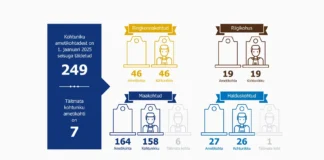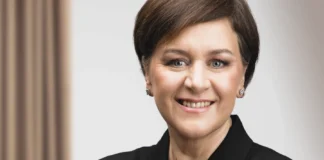Yearbook of Estonian Courts 2024
Foreword
Villu Kõve, Chief Justice of the Supreme Court
The judicial system has had a busy, difficult and, one might say, turbulent year. The working groups that convened in 2023 to review the court management model and prepare the court development plan presented the results of their work in 2024. ...
The judicial system has had a busy, difficult and, one might say, turbulent year. The working groups that convened in 2023 to review the court management model and prepare the court development plan presented the results of their work in 2024. ...
The judiciary as of early 2025
Kristi Jakobsoo, Human resources specialist at the Supreme Court
Ave Hussar, Head of the Supreme Court personnel and communication department
As of the beginning of 2025, there were 256 judge and justice positions in Estonia – together with the so-called temporary judge positions and the specifications established for 2025 – and 249 of these were filled. ...
Ave Hussar, Head of the Supreme Court personnel and communication department
As of the beginning of 2025, there were 256 judge and justice positions in Estonia – together with the so-called temporary judge positions and the specifications established for 2025 – and 249 of these were filled. ...
Cultured feedback and feedback culture
Ave Hussar, Head of the Supreme Court personnel and communication department
The lack of a system that identifies personal training needs has caused the TC to repeatedly discuss how to train judges who keep making the same mistakes in their work, and how to ensure the training is effective. ...
The lack of a system that identifies personal training needs has caused the TC to repeatedly discuss how to train judges who keep making the same mistakes in their work, and how to ensure the training is effective. ...
Disciplinary proceedings against judges: international standards and practice in Estonia
Oliver Kask, Justice of the Supreme Court
In recent years, disciplinary proceedings against judges have become increasingly common. Whether this is because there is a widespread burnout among judges, mistakes when recruiting judges have become more frequent or whether it is just a coincidence, the author doesn’t know. ...
In recent years, disciplinary proceedings against judges have become increasingly common. Whether this is because there is a widespread burnout among judges, mistakes when recruiting judges have become more frequent or whether it is just a coincidence, the author doesn’t know. ...
Evaluation system and its positive (and negative) aspects in relation to the work of judges in Slovenia
Erik Kerševan, Judge of the Supreme Court of the Republic of Slovenia
Every judicial system tries to find appropriate solutions to the challenges it faces, which means that in many Member States of the European Union, the paths are different, but the goal is the same: a well-functioning judiciary and motivated, competent and responsible judges ...
Every judicial system tries to find appropriate solutions to the challenges it faces, which means that in many Member States of the European Union, the paths are different, but the goal is the same: a well-functioning judiciary and motivated, competent and responsible judges ...
Self-evaluation of a judge as an element of the performance evaluation and professional feedback mechanism
Reda Molienė, Research coordinator of the project “Portrait of a Judge”
Facilitation of feedback culture in the judiciary requires a new approach to the evaluation of the activities of a judge, first and foremost perceiving it not as a control or potential sanctioning instrument, but as a mechanism to help the judge grow professionally ...
Facilitation of feedback culture in the judiciary requires a new approach to the evaluation of the activities of a judge, first and foremost perceiving it not as a control or potential sanctioning instrument, but as a mechanism to help the judge grow professionally ...
Overview of the Practice of the Disciplinary Chamber of Judges in 2024
Paavo Randma, Justice of the Supreme Court, Chair of the Disciplinary Chamber
According to subsection 93(1) of the Courts Act, disciplinary cases of judges are adjudicated by the Disciplinary Chamber, which is comprised of five justices of the Supreme Court, five Circuit Court judges and five judges of courts of first instance. ...
According to subsection 93(1) of the Courts Act, disciplinary cases of judges are adjudicated by the Disciplinary Chamber, which is comprised of five justices of the Supreme Court, five Circuit Court judges and five judges of courts of first instance. ...
The Ethics Council in 2024
Andra Pärsimägi, Judge of Tartu Circuit Court, member of the Ethics Council
The core texts of professional ethics for judges include the Bangalore Principles. According to the preface to the Bangalore Principles, the principles are of great value not only for the judiciaries of all nations, but also for the general public ...
The core texts of professional ethics for judges include the Bangalore Principles. According to the preface to the Bangalore Principles, the principles are of great value not only for the judiciaries of all nations, but also for the general public ...
Activities of the Council for Administration of Courts in 2024
Karin Leichter-Tammisto, Legal Adviser to the Chief Justice at the Supreme Court of Estonia
The Council for Administration of Courts is an advisory body convened to manage the judicial system, which, in cooperation with the Ministry of Justice and Digital Affairs (before 1 January 2025, the Ministry of Justice), administers courts of the first and second instance. ...
The Council for Administration of Courts is an advisory body convened to manage the judicial system, which, in cooperation with the Ministry of Justice and Digital Affairs (before 1 January 2025, the Ministry of Justice), administers courts of the first and second instance. ...
Review of Supreme Court matters in 2024
Liina Reisberg, Head of the Legal Information and Judicial Training Department of the Supreme Court
Signe Rätsep, Chief Specialist of the Legal Information and Judicial Training Department of the Supreme Court
The number of requests for proceedings received has increased by 10% compared to the previous year, while the number of requests reviewed has remained the same. ...
Signe Rätsep, Chief Specialist of the Legal Information and Judicial Training Department of the Supreme Court
The number of requests for proceedings received has increased by 10% compared to the previous year, while the number of requests reviewed has remained the same. ...
Procedural statistics for district, administrative and circuit courts in 2024 based on the principles of the workload methodology
Külli Luha, Analyst of the Courts Division of the Ministry of Justice and Digital Affairs
In 2024, 35,238 civil matters (0.3% more than in 2023) and 15,753 criminal and misdemeanour matters, including 11,053 criminal procedure matters (3.1% less than in 2023) and 4700 misdemeanour procedure matters (3.6% less than in 2023), were received by district courts for adjudication. ...
In 2024, 35,238 civil matters (0.3% more than in 2023) and 15,753 criminal and misdemeanour matters, including 11,053 criminal procedure matters (3.1% less than in 2023) and 4700 misdemeanour procedure matters (3.6% less than in 2023), were received by district courts for adjudication. ...














